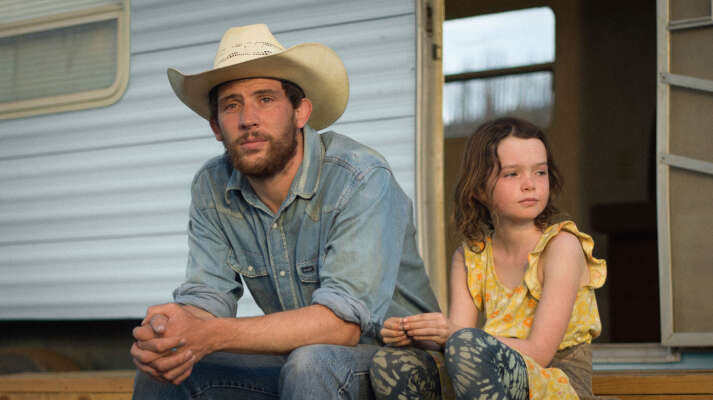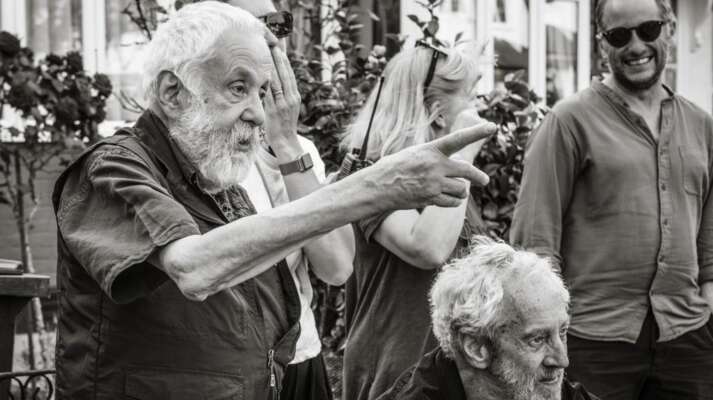Ian McEwan's Novels to Film
From On Chesil Beach to Atonement, the acclaimed British author's novels have made memorable films
Ian McEwan's Novels to Film
Written by Peter Bowen
After writing his novel On Chesil Beach in 2007, Ian McEwan did something he rarely does—he wrote the screenplay. Even before the novel hit bookstores, film companies were interested in turning this story into a movie. Traditionally McEwan has left the job of adaptation to others, joking, "In the time it takes me to write two screenplays that do not get made, I could have written two new novels." But the elegant way the book tells how an eventful wedding night in 1962 utterly changed the destinies of a newly married couple seem to translate perfectly into a screenplay. Director Dominic Cooke was so impressed with McEwan's adaptation that there was very little to do before filming. "He is so specific about character and place," Cooke explained. Saoirse Ronan, who stars alongside Billy Howle, was thrilled to reunite with McEwan after having helped bring his novel Atonement to the screen a decade before. "Ian is someone who writes women incredibly skillfully," notes Ronan. In the last forty years, Ian McEwan has written some of Britain's most acclaimed novels. Both he and his work have won nearly every literary award, including the Man Booker Prize. McEwan made The Times' list of "The 50 greatest British writers since 1945." It is no wonder then that so many of his novels have been adapted into films, with still more in development. We look at some of McEwan's more notable adaptations.

Atonement |
The life-changing power of storytelling
Ian McEwan's 2001 novel Atonement began with a single image. While sitting in a park with his boys playing nearby, McEwan imagined "a young woman standing in a doorway, with wild flowers in her hand, looking for a vase." Spiraling out from single thought came an epic tale of three people whose lives are tragically intertwined by the lie one of them tells. Both an emotional story of England before and during World War II and an astute post-modern lesson on the unreliability of fiction, Atonement became an instant classic. Shortlisted for the Man Booker Prize, the novel went on to win numerous literary prizes as well as make Time Magazine's All-TIME 100 Greatest Novels list. Christopher Hampton adapted the novel for Joe Wright's 2007 film, with James McAvoy, Keira Knightley, and Saoirse Ronan as the three main characters. Nominated for seven Academy Awards, the film was herald by critics as a model of film adaptation. "Nothing in Joe Wright's screen version of Ian McEwan's dense, internalized 2001 novel of secrets and lies should really work," wrote Rolling Stone's Peter Travers. "But damn near everything does. It's some kind of miracle."

The Cement Garden |
A story for a new generation
In 1978, Ian McEwan published his first novel The Cement Garden, a gothic exploration of four children left to raise themselves after their parents die. While this dark, tangled tale of children run amok shocked some more conventional critics, a whole new generation of readers found McEwan's honesty fresh and inspiring. Novelist William Sutcliffe remembers in The Guardian, "I was given The Cement Garden, and my life changed…Since then, all the hours I have spent reading, every single week of my life, have perhaps been an attempt to touch again the thrill and amazement of that night, when a door opened into a room I have never wanted to leave." In 1994, writer/director Andrew Birkin brought that fevered dream of four children to the screen with Andrew Robertson and Charlotte Gainsbourg (in her first English-speaking role) as the older brother and sister. Birkin won the Silver Bear for Best Director at the Berlin Film Festival for a film The Independent called "an elegant and absorbing study of the orphans' strange, hothouse world."

The Comfort of Strangers |
A voyage into darkness
With his second novel The Comfort of Strangers, Ian McEwan went deeper into the nature of desire and self-deception. When Mary and Colin, a young English couple vacationing in a city very much like Venice, get lost in a neighborhood of labyrinthine canals, they are rescued by a local named Robert who takes them home to meet his wife Caroline. This seemingly random act of kindness, however, grows darker with every page. As they learn more about their strange new friends, Mary and Colin find themselves increasingly fascinated and repulsed, until they discover they have gone too far. Calling McEwan "a writer of enormous talent," The New York Times reviewer John Leonard exclaims, "No reader will begin The Comfort of Strangers and fail to finish it; a black magician is at work." In 1990, Harold Pinter adapted McEwan's novel for director Paul Schrader. With Natasha Richardson and Rupert Everett playing Mary and Colin, the film cast Christopher Walken and Helen Mirren as the mysterious couple the two have the misfortune to meet. "Schrader is an astute guide through the circuitous byways of sexual manipulation," notes Rolling Stone's Peter Travers. "His hypnotic thriller supplies intelligent pleasures as well as gruesome chills."

The Innocent | The secrets within
Published in 1990, The Innocent marked a change in style and substance for McEwan. Loosely based on an actual incident, the novel is set in Berlin in 1955. A young naïve Englishman, Leonard Marnham, has been hired by the Americans as a technician to install surveillance equipment in Berlin to monitor the Soviets. But when a night out with a date goes horribly wrong, Marnham finds himself in a political and personal mess that forces him to betray his country and the woman he loves. Set in the world of John le Carré's espionage thrillers, the novel's cloak-and-dagger backdrop ultimately reveals itself to be more about the enigma of the human heart than top-secret missives. The Innocent is "a haunting investigation into the varying and troubling possibilities of knowledge," exclaims Michael Wood in The London Review of Books, adding about McEwan that "the sheer cleverness of the book is dazzling." Indeed even when it ends you realized that you never saw the real story. The book's coda, in which Marnham learns some thirty-two years later what really happened in Berlin, introduces McEwan's characteristic narrative turn of telescoping an entire life from a single moment. The Innocent was adapted by McEwan for John Schlesinger's 1993 film of the same name, with Campbell Scott as the English technician and Anthony Hopkins as a CIA operative. "What begins as a low-key tale of espionage, with allies spying on each other and everybody's motives in doubt, becomes a tense and suspenseful love story with Hitchcockian overtones," writes Caryn James in her review for The New York Times.

Enduring Love |
The thin line between truth and madness
In figuring out the plot for his 1997 novel Enduring Love, McEwan was drawn to a real-life anecdote that illustrates the complexity of human nature. "I heard this true story about a man and his son who were hauled away by a balloon they were trying to tether in some field in Germany," McEwan told Salon. "If you all hang on, you can bring this balloon down to earth. But as soon as anyone breaks rank, then madness follows." His novel begins with just such a story of people trying to keep a hot-air balloon from flying off, an episode that ends with one man dead and another being stalked by a drifter who suffers from de Clérambault's syndrome, a rare form of erotomania that makes its sufferer believe a stranger has fallen deeply in love with him or her. "McEwan has fashioned a remarkable novel, haunting and original and written in prose that anyone who writes can only envy," writes The Washington Post's Jonathan Yardley. An appendix at the end of the novel demonstrated how skillful a writer McEwan can be. A monograph entitled "A Homo-Erotic Obsession, with Religious Overtones: A Clinical Variant of de Clerambault's Syndrome," penned by Drs. Robert Wenn and Antonio Camia, provides the case study the novel appears to allude to. Only the scientific paper, which McEwan presented for publication, was all made up, a fact he revealed only after fooling both book reviewers and psychologists alike. "It's always very tempting for a writer to blur the line between fiction and reality," McEwan explained to The Guardian. In 2004, Roger Michell directed an adaptation of the novel with Daniel Craig and Rhys Ifans in what The A.V. Club's Nathan Rabin called "a wrenching, uncompromising study of the human mind in freefall."


